By Maggie Shui
Hundreds gathered at Aotea Square in Tāmaki Makaurau today for the Stop Asian Hate march. Tunes from the Nepal Festival - which fittingly shared Aotea Square with the protest - provided background music for the rally speeches and chants. We spoke to some attendees about what moved them to lend their voices to the march.
Tao Lin
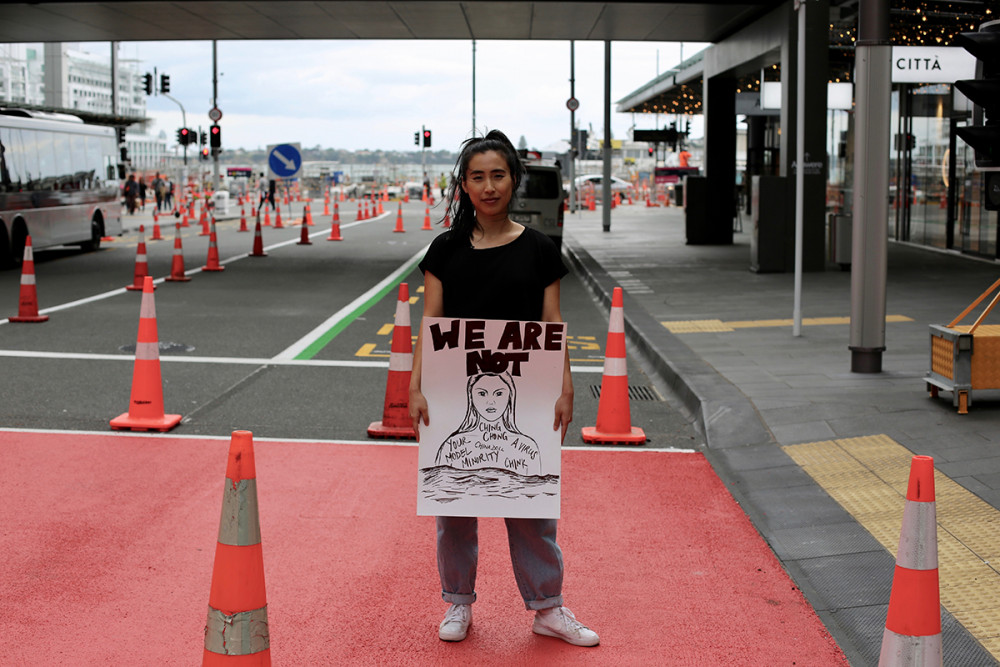
What motivated you to come out today?
I think being part of the Asian community, no matter where you are, we feel such rage and sadness and anger at everything that's going on - not just in America, but all the anti-Asian racism and violence that's happening. I really feel like it's important to show up and to help amplify our voices.
How does it feel to see so much of the Asian community out here today?
It's honestly so moving. I feel like as Asians, we tend to just keep to ourselves and to keep quiet and to keep our heads down and to just get on with things. It's so nice to come out and be present with a community and to feel a part of the community and to know that there are others here who also feel the same way.
Can you describe for me a moment where you were treated in a dehumanising way?
One moment, in particular, where I felt dehumanised as an Asian woman was when I was lining up for a show with my white friend. And a guy walked past us and he yelled out to my friend, "What's wrong? Can't you find a Kiwi girlfriend?" And nobody said anything. Which was probably just as bad as the guy who walked past and yelled that out. So yeah, that that's probably something in recent memory that's happened.
How did you feel in that moment?
I was shocked. I just didn't know how to react. I think when you're in that situation, you're kind of shocked and you just - you don't know what to say.
What would you say to those people now?
There's a certain point where I think there's only so much you can do and say, if people were so stubborn about being bigoted, and racist, and I don't think there's a lot that you can say to that person in particular. It's more important to continue doing the work and to speak out and to join in these kinds of events.
Naz Ahmed
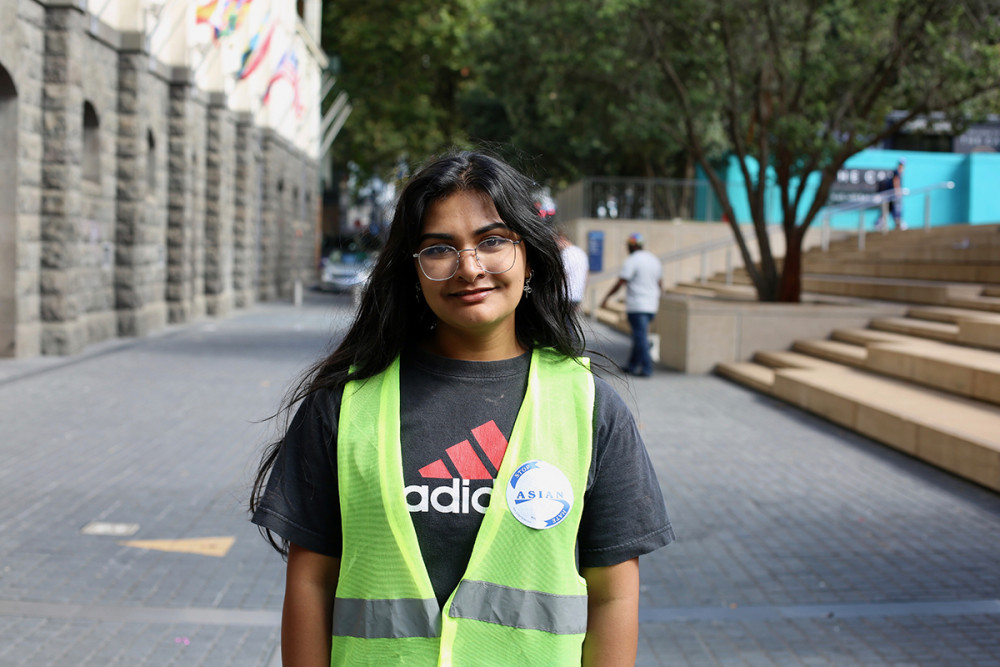
What brought you to the march today?
It's been quite disheartening to see the recent increase in Asian violence. Just seeing people being racist and how normalised it’s become. It’s been really disheartening seeing how it’s affected the Asian community here.
How did you feel when you heard about the shootings in Atlanta?
Horrible. It's a real tragedy that occurred. But the thing that made me really angry is how the media reported it. People wanted to tiptoe around the fact that this is clearly a racial issue. There's such a clear double standard when these things happen to minorities versus when they happen to, you know, the majority. And I don't think that's fair.
Can you tell me about a moment where you’ve been dehumanised as an Asian woman?
A moment when I felt dehumanised as an Asian woman was soon after the Christchurch shootings happened. I found a lot of people, while they were trying to be supportive and they had like a good motivation behind it, they would often try and tell me how to feel and how to respond to the situation. So they would use statements like "Oh, you probably feel like people are racist, but that is not true". Whereas I really wish that people took the time to have a conversation with me and understand how I'm actually feeling and then learn what the best way to support me was. It was tough because a lot of it came from people I considered close friends.
What would you say to those people now?
I would say, in any of these situations, when there is a minority being targeted, it's really important to listen to the people around us and to not make assumptions so we can understand what we can do. Listen so that we can learn how to support these communities.
Arama Cookson
Ngāti Kahungunu, Ngāti Kanohi, Te Arawa, Tainui, Ngāti Kahu
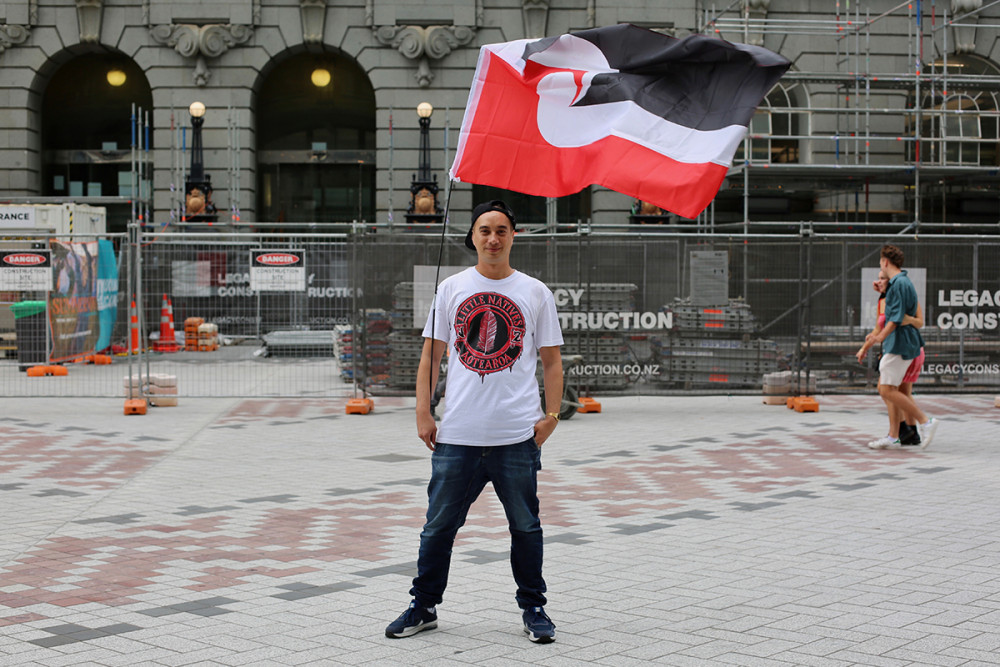
What motivated you to come out today?
What motivated me to come out was being tangata whenua and supporting Asian brothers and sisters in their struggle. It's a shared struggle.
What does Māori-Asian solidarity look like to you?
Even the future of Māori itself is diversity. I personally have Filipino cousins, I have Samoan cousins, I have Japanese cousins. So it's broad. And so the future of Māori is everybody. All of Asia included. Connection comes when we can identify all the things that we have in common, and celebrate those things.
Your partner is Asian - what kinds of things do you find you have in common with her culture?
There's a lot of similarities that we find between our cultures. Surprisingly, what we bond on is how they're more similar than Pākehā culture. There's a lot of cultural similarities, I guess, cultural alignments that are different to the Pākehā world. Especially just basic person-to-person respect. For us, Pākehā culture seems foreign.
Can you describe a moment where you’ve witnessed someone be racist towards your partner?
It can be as simple as a glance, or just somebody ignoring her. That happens to me too; I just noticed the same things that happen to me.
Joanna Ho
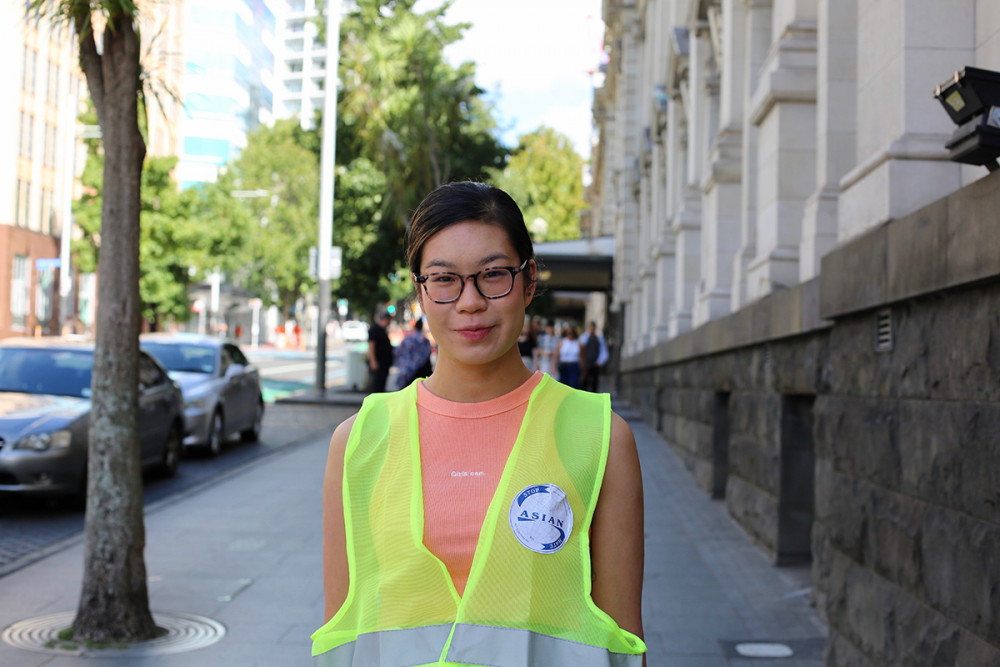
Where do you whakapapa to?
My parents are from Guangzhou, China and they immigrated here in 1996. I was born in 97 in Palmy.
What pushed you to come to this march today?
Growing up in New Zealand, racism has always been… I've lived it my whole life. It's only recently that people were starting conversations about it. I just wanted to be a part of that and tell my story because even though [the Atlanta shootings] happened in the USA, it's an extension of our narrative as well. I just wanted to come and support that.
Why now?
Enough is enough, right? I think we've just been through too much. Racism towards Asian people has happened ever since the gold miners came in the 1800s.
Tell me about a moment where you’ve been dehumanised as an Asian woman.
When people tell you to go back to your own country, you don't belong here, even though I was born here. It's quite frustrating, because my sense of belonging and identity is kind of everywhere. Every time I visit China, I feel like a foreigner, I feel like a foreigner here. And I just don't have a sense of belonging at all. And being an Asian woman as well, society is not built for people like me. I'm not a straight white man. If you are that, you're at the top of the food chain. And I don't think a lot of people understand how that affects society.
What can non-Asian New Zealanders do to help make Aotearoa a safe home for you?
Educating yourself. Actively educating family and friends. And if you see it happening, speak up, because sometimes we're too scared to speak up. When an ally stands out for us, it's a really good feeling. It makes us feel a lot safer. And it makes us feel like a part of society.
Sophyia Hilario
Stop Asian Hate March organiser
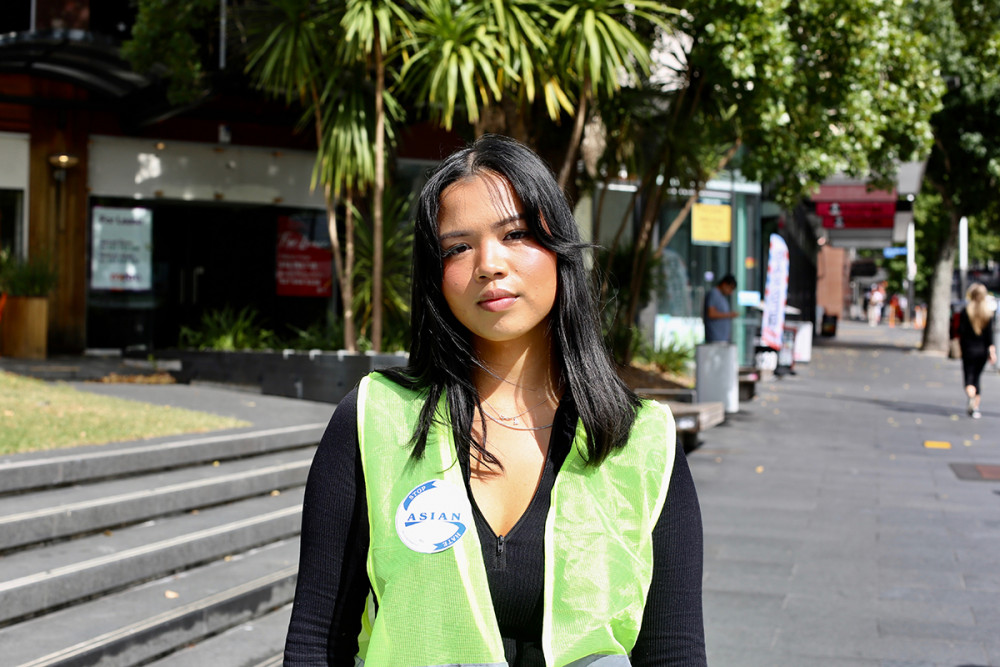
Where do you whakapapa to?
I'm Filipina. I was born in the Philippines in Manila, but I grew up here since I was seven years old. So I've been here for 14 years now.
What motivated you to help organise the event today?
Being Asian and growing up in New Zealand as a migrant, we've faced racism pretty much the minute we set foot here.
The shootings in Atlanta, Georgia was a turning point for Asians. That was the last straw. Enough is enough. We've been so ostracised. Anywhere we go, any western country that we move into, we are seen as “foreigners”. We get asked every single day, where are you from? We want people to understand, we're from here. This is us. This is our home. We can be born here and be from here. We don't have to be from somewhere else. We need to quash the idea that we are others and that we are aliens in this country.
Can you tell me about a moment where you’ve been dehumanised as an Asian woman?
A moment where I felt dehumanised as an Asian woman is honestly in my dating life. When I am being fetishised, I'm being used and being loved or attracted to by my race. By the fact that my eyes are slanted, the fact that I have brown skin, black hair. And I see that in the eyes of these men that approach me, you can see that the only stereotype they've seen of Asians is in Asian porn, has been in movies that have been popular in Hollywood where we see the hot Asian woman, the hot Asian sex worker.
And in general, with this whole Coronavirus thing going on as well, we're polarised with the fact that we're being put on a pedestal, but then we're also being labeled as viruses and as contagious. So we feel really gross. We just feel gross. And that's no way that anyone should feel.
Amy Ha and Sam Negash
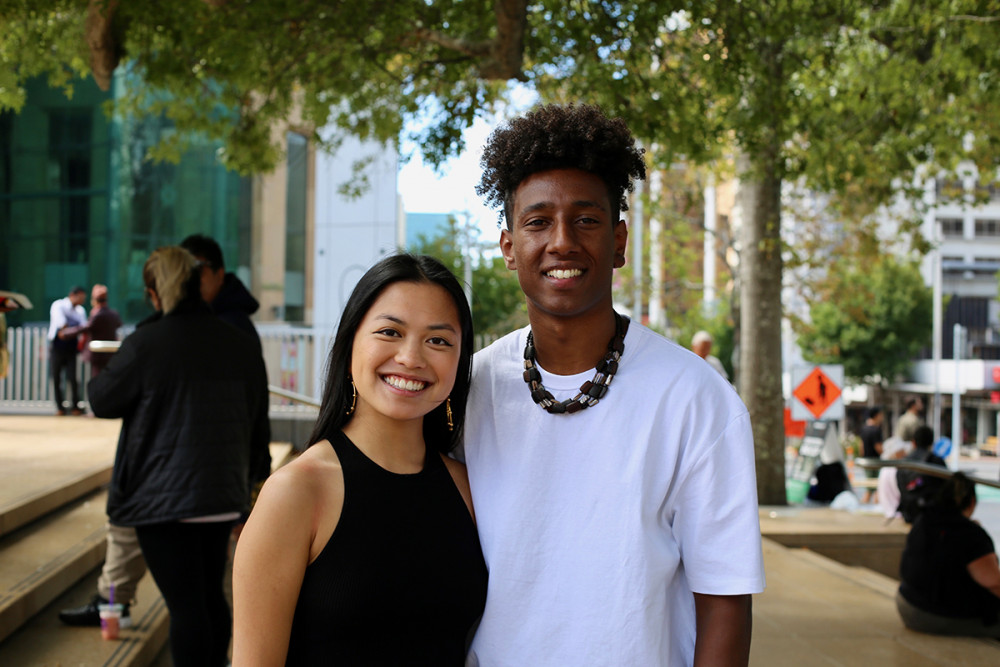
What brings you here today?
Sam: Black Lives Matter before and now we're addressing issues with the Asian community as well. Just being here and supporting as much as we can. I'm taking photos here as well, and hopefully just get the message out. We're starting a platform for something new, I think, and this is just the beginning.
Amy: My main motivation would probably be my mom and my dad. They're both refugees from Vietnam. And they love being here so much. But over the years, I've noticed how people treat them. So that'd be my main motivation for coming out to support and everything.
What can we do to make Aotearoa a safe home for Asian New Zealanders?
Sam: We need to stand together at this point, and start addressing these issues so they don't go any further. I live in a community where we have a Dominion Road. It's literally like Chinatown. And for them, I think, they are looked at very differently - within my own church, even. We have a whole Asian church and we have a white church as well. It's stuff like this that frustrates me. Like, we can't have a congregation together? Why are they separate? Because we're "different", you know. You know, New Zealand's diverse and I think people need to accept that.
Amy, what kind of racism have you experienced growing up in Aotearoa?
I feel like for me, I've always had little moments. But I feel like little things always add up into bigger things. When I was growing up, people always looked at me and they were like, “Wow, your eyes are so big for an Asian,” or, “Wow your English is so good.” And that they didn't expect me to speak English.
I think in those moments, I didn't really understand why they were saying that to me. And as I grew older, I slowly started to understand that it wasn't right for them to say.
How did you feel when you started to realise that wasn't something you should put up with?
Angry. So angry.
Kaya Arai
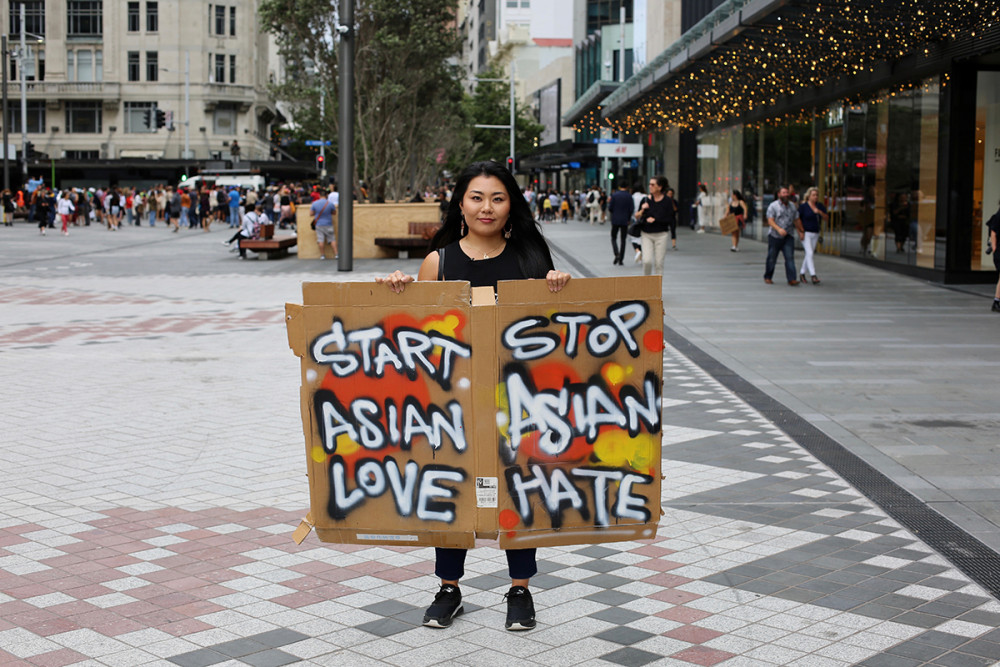
What motivated you to come to the march today?
I faced my own racism, both from my external environment and internally. It's taken me a very long time to come to terms with that and also process all of that internalised racism and find my voice. And now that I have, I find it important to support causes that I believe in and one is just racism in general. So there's no way I could not participate today.
Can you tell me about a moment where you’ve been dehumanised as an Asian woman?
There are many moments I felt dehumanised. Being Asian, it's kind of on a daily basis. You're always reminded that you're different. Anywhere from the workplace and people making jokes about what you might be eating or your name or not being able to pronounce things properly, through to just going into a store and not being acknowledged. So I can't say there's one moment, in particular. It's a lot of microaggressions all piled into one and that adds up.
How does it feel when it piles up?
It's frustrating, it's hurtful. But at the same time, you're used to it. You're almost desensitised to it. It's a sense of normality for you. I've been trying to work on realising that it's actually not normal and to stand up against it.
What actions can we take to make Aotearoa a genuine, safe home for everyone?
Some actions we can take to make Aotearoa safe for everyone is just to educate. And for people like us who've experienced racism to really stand up and talk about it because I think the big thing for me was not feeling like I could talk about it and feeling like my problems were invalid. Now, finding a community of people that believe the same thing, that have felt the same thing and experienced the same experiences... it's empowering.
Related stories:
Māori-Asian solidarity in Aotearoa can be game-changing
Asian New Zealanders are grieving after the Atlanta shooting
The Asian beauty wave: monolids, puppy eyes and self-realisation